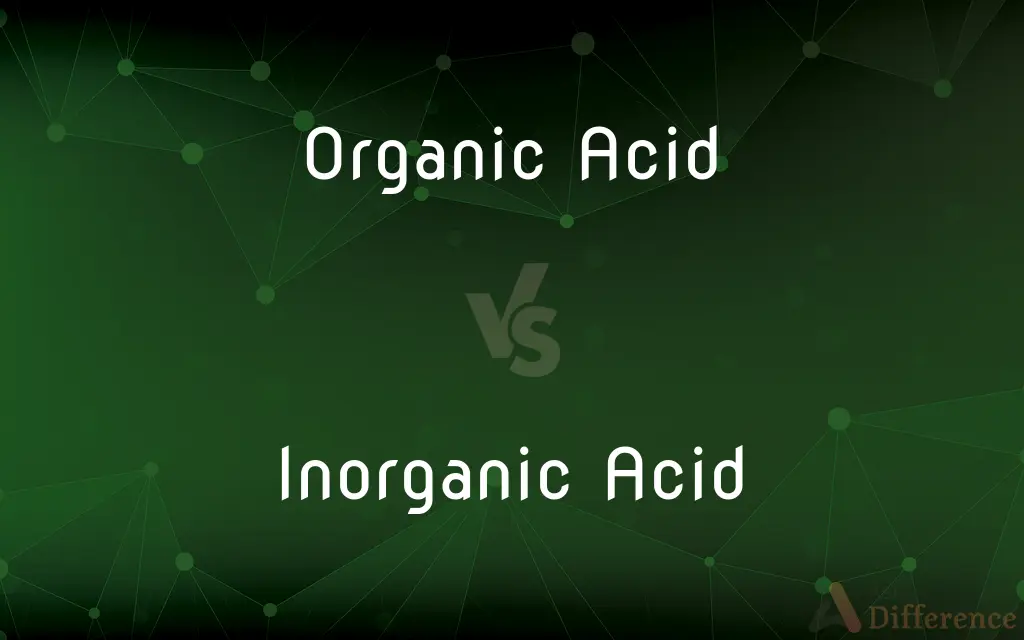Organic Acid vs. Inorganic Acid — What's the Difference?
By Tayyaba Rehman — Published on January 5, 2024
Organic acids contain carbon and are generally weaker, while inorganic acids lack carbon and are usually stronger.

Difference Between Organic Acid and Inorganic Acid
Table of Contents
ADVERTISEMENT
Key Differences
Organic Acid contains carbon and hydrogen; Inorganic Acid lacks carbon, often has metallic atoms.
Organic Acid generally has a weaker acidic nature; Inorganic Acid is often stronger and more corrosive.
Organic Acid is derived from living organisms or their products; Inorganic Acid originates from mineral sources.
Organic Acid typically has a complex structure; Inorganic Acid usually has a simpler molecular structure.
Organic Acid includes carboxylic acids; Inorganic Acid includes sulfuric, hydrochloric, and nitric acids.
ADVERTISEMENT
Comparison Chart
Composition
Contains carbon and hydrogen
Lacks carbon, may contain metallic atoms
Acidic Strength
Generally weaker acids
Usually stronger and more corrosive
Origin
Derived from living organisms or their products
Originates from mineral sources
Molecular Structure
Typically complex
Simpler molecular structure
Examples
Includes carboxylic acids
Includes sulfuric, hydrochloric, nitric acids
Compare with Definitions
Organic Acid
Acid containing carbon and hydrogen.
Acetic acid in vinegar is an Organic Acid.
Inorganic Acid
Acid lacking carbon.
Sulfuric acid used in batteries is an Inorganic Acid.
Organic Acid
Generally weaker than inorganic acids.
Lactic acid in sour milk is an Organic Acid.
Inorganic Acid
Generally stronger and more corrosive.
Nitric acid used in fertilizers is an Inorganic Acid.
Organic Acid
Contains the carboxyl group.
Formic acid in ant bites is an Organic Acid.
Inorganic Acid
No organic origin.
Hydrofluoric acid used in etching is an Inorganic Acid.
Organic Acid
Derived from living organisms.
Citric acid in fruits is an Organic Acid.
Inorganic Acid
Often derived from minerals.
Hydrochloric acid in stomach is an Inorganic Acid.
Organic Acid
Found in biological systems.
Malic acid in apples is an Organic Acid.
Inorganic Acid
Simpler molecular structure.
Phosphoric acid used in soft drinks is an Inorganic Acid.
Common Curiosities
Are Organic Acids always weak?
They are generally weaker than inorganic, but some can be relatively strong.
What is an Organic Acid?
An acid containing carbon, generally weaker.
What are common examples of Organic Acids?
Acetic acid, citric acid, and lactic acid.
What is an Inorganic Acid?
An acid without carbon, usually stronger.
Can Inorganic Acids be found in living organisms?
Yes, some like hydrochloric acid are naturally present in organisms.
Do Organic Acids have a complex structure?
Yes, they typically have complex molecular structures.
Are Inorganic Acids used in food?
Generally, no; they're too strong and corrosive for food use.
Where are Inorganic Acids commonly used?
In industry, manufacturing, and cleaning agents.
What are common examples of Inorganic Acids?
Sulfuric acid, nitric acid, and hydrochloric acid.
Where are Organic Acids commonly used?
In food, beverages, and pharmaceuticals.
Is battery acid an Organic or Inorganic Acid?
Battery acid is sulfuric acid, which is an inorganic acid.
Do Inorganic Acids have simple structures?
Yes, their molecular structures are usually simpler.
Are all Organic Acids safe for consumption?
Not all; some are toxic or harmful.
Is vinegar an example of an Organic Acid?
Yes, vinegar contains acetic acid, an organic acid.
Can Organic Acids be synthetically produced?
Yes, many organic acids can be synthesized in laboratories.
Share Your Discovery

Previous Comparison
Ti-Plasmid vs. Ri-Plasmid
Next Comparison
Catecholamines vs. AcetylcholineAuthor Spotlight
Written by
Tayyaba RehmanTayyaba Rehman is a distinguished writer, currently serving as a primary contributor to askdifference.com. As a researcher in semantics and etymology, Tayyaba's passion for the complexity of languages and their distinctions has found a perfect home on the platform. Tayyaba delves into the intricacies of language, distinguishing between commonly confused words and phrases, thereby providing clarity for readers worldwide.
















































